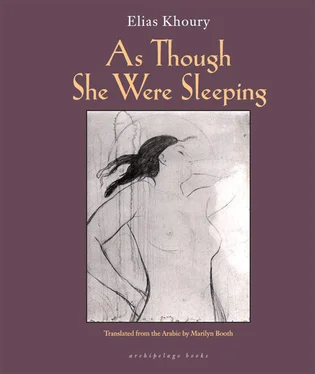Elias Khoury
As Though She Were Sleeping
Death’s a long sleep from which one wakes not
And sleep’s a short death from which one must rise
ABU EL-A’LA EL-MA’ARRI
She is not dead, but is sleeping.
THE GOSPEL OF LUKE 8:52
MILIA’S EYELASHES drew apart over eyes still curtained in drowsiness. She would just close them again, she decided; she would pick up the trail of her dream. She saw a small white candle giving off a wan light that trembled and flickered through the fog. His fist closed tightly around the candle, Mansour walked ahead directly in front of the taxi, the wind buffeting his long overcoat, but she could not make out her husband’s features clearly. She reached for the glass of water that she kept habitually on the bedside table but found no glass there. She was thirsty. The dryness diffused along her tongue and broke against the roof of her mouth and down her throat. She dragged her left arm out from beneath her head on the pillow to arrest the numbness creeping from her upper arm toward her neck. She turned over in bed, and over again, and then lay finally still on her back. She put out her hand for the glass of water and found no table there. She shuddered, jerked upright, and suddenly found herself sitting against a wooden headboard. Where had it gone, that familiar white wall against which she propped her head? She could always sense the peeling white paint cracking and splintering beneath her long hair, even commingling with it as she rested her head on the wall. She pressed her arms to her chest, just touching the warm skin of her breasts. Suddenly she was afraid and the coldness of it slunk into her thighs. She placed a hand there to press away the trembling in her legs. Her palm brushed against naked skin, glided upward as far as the top of her thighs went, and she felt blood collecting there. Gone cold, the blood had formed a solid mass at the lowest curve of her belly.
This is marriage, she said, her voice almost a whisper, and closed her eyes again.
Milia’s memory preserved the scene at Dahr el-Baydar as though it were a shadow play etched black and solid on the wall. Her husband, Mr. Mansour Hourani, holds a small candle before him as he steps forward in front of the car, still wearing his black wedding suit though a long olive-green overcoat covers it. The young woman in her white bridal finery sits on the backseat, swathed in darkness, staring at the driver’s bald head glinting with dandruff. Once they are in Nazareth, she decides, she will tell her husband how his image has been imprinted permanently on her eyes — today, on this evening — as a black wraith fading and disintegrating, appearing and disappearing ahead of the car whose headlights cannot cut through the viscous fog blanketing the heights of Dahr el-Baydar on this snow-mantled night.
At three o’clock, on the afternoon of Saturday the twelfth of January, in the year 1946, Mansour and Milia were married in the Church of the Blessed Archangel Mikhail, their union blessed by Father Boulos Saba. Following the service, the bridal pair stood before the church door surrounded by Milia’s family tendering their congratulations. The tears collected in Milia’s eyes so heavily that she could not make out even a single well-wisher, as familiar to her as they all were. Her tears overwhelmed her, spurting out as if intending flight before landing heavily on her pale cheeks. Mansour, the thin line of his lips wholly captured and partly transformed by a broad smile that revealed his small lustrous teeth, was oblivious to his bride’s weeping until he heard her mother scolding her. Shame on you, dear — Milia, stop it! Ayb . For shame — are we burying someone, girl? It’s a wedding, after all.
And when all of the guests had gone, carrying away the little silver boxes filled with sweets; and when no one was left in the churchyard apart from members of the family, the mother went to her daughter. She pulled the younger woman to her chest and, their bodies quivering, mother and daughter wept together. Then the mother pushed her daughter away. Even if you are breaking my heart, dearest, leave us to do the crying. You must show how happy you are! Come, now, we want to see it on your face! The bride smiled, choking back her tears, while the mother went on crying before releasing the joyful trill — yuuyuuyuu! — of her celebratory zaghruda into the air.
Milia’s brothers clustered around the newlyweds. It was Musa who particularly caught the bride’s attention, though. The pupils of his eyes seemed to cringe and recede inside their sockets. She sensed danger but could not define where it was coming from. She raised her arm, unconsciously almost, as if to shield her husband’s face from her brother’s stare.
Milia opened her eyes and saw nothing but the darkness of the night. She made up her mind to keep going. She would follow this odd dream of hers, for even in the face of her fear it reassured her. Finally the dream-spaces had come back to inhabit her nights.
In her dreams Milia had seen herself a small girl of seven, her skin tawny and her hair short and curly. The little girl scampered and darted among the grown-ups, espying everything there was to see. And when Milia got up in the morning she would tell things exactly as she pleased. But the reactions were always unpleasant: everyone stared at her, startled and dismayed, for these dreams of hers were like prophecies that somehow always come to fruition. But here and now, in this unfamiliar bed tucked inside of a murky blackness that thickened to press hard against her eyes, she dreamed of herself, a woman of twenty-four, her naked body lying full length across a bed not her own, her head on an unfamiliar pillow.
Milia opened her eyes to arrange her dream properly before going back to sleep. She saw nothing but a pair of eyes open upon the darkness.
She opened her eyes. She saw her own eyes, open. She was afraid.
The man leaned against the trunk of the lilac tree. He told her about the sky-blue glow that tinted the whiteness of her eyes and gave them a heavenly look. Her pale-white skin and her long neck, he said, had brought him here, not to mention her honey-toned eyes and the chestnut color of her hair streaming down her shoulders. All the way from his distant city her image had carried him. Here, to marry her. And he said he loved her. Where had he said these things? And why, awakening from this dream, did she find the dream still there, and why did it leave her seeing nothing but a pair of eyes open upon the darkness?
Milia decided to get out of bed and fetch a glass of water. She saw her own white nakedness reflected in the twin mirrors of her eyes. She closed her eyes again and made up her mind to ask the man who slept on this bed beside her, his back turned, to come back inside the car because she was worried for his safety. She closed her eyes and saw herself slipping: she was drifting into the white vapor outside. She forgot her thirst at the sight of a woman naked and prone, before her a windshield fogged over with human breath and a man walking in front of the car carrying the trembling flame of a candle as if he would pierce the solid fog in his black wedding suit and his olive-green overcoat.
Silence; a naked woman; a vehicle creeping almost imperceptibly through the dreary fog; a driver hunched close over the steering wheel trying to see the road through a windshield splotched with white; and a man walking before the car draped in white fog and clutching a white candle.
The candle went out or at least it looked that way to her. The man came to a stop, standing in the middle of the road, opening his overcoat as if trying to shelter the candle inside so that he might ignite its flame again. He crooked his back and leaned into the wind; the flaps of his coat flew upward, but the man himself remained motionless, there, outside on the road. The driver’s breathing accelerated, coming faster and louder. Every so often he opened the car window, sticking his head out and shouting into the wind, but she could not make out any of his words.
Читать дальше












